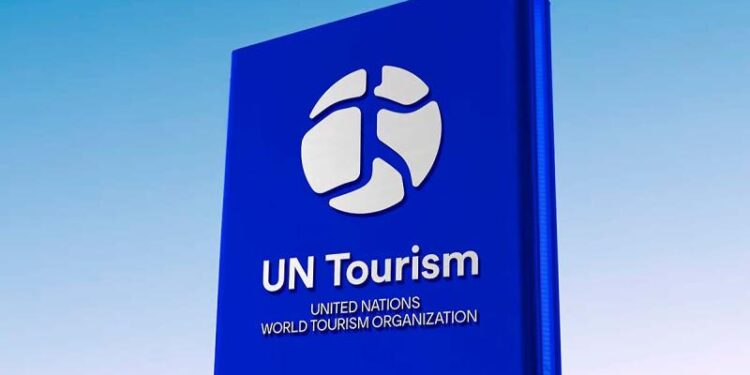The UN Tourism Executive Council will meet on May 30th and must propose to the General Assembly the appointment of the organization’s Secretary-General for another four-year term. The United Nations Tourism Office, headquartered in Madrid and recently celebrating its 50th anniversary, is currently headed by Georgian Zurab Pololikhasvili, who has served two terms and is running for re-election.
This possibility was initially questioned from a legal perspective; however, the organization’s own reports on the matter support the candidacy of the current Secretary-General, and there is no longer any formal doubt in this regard. This issue has been used by other candidates as an impediment to question Pololikashvili’s continued presence, to the point that the Spanish Minister of Tourism, Jordi Hereu, at this year’s FITUR conference, declared that Spain favored strict compliance with the law in the elections for Secretary-General of UN Tourism. Ultimately, all these doubts have been dispelled, and therefore, nothing now influences the free choice by the States that make up the Executive Council for the May election.
THE EXECUTIVE COUNCIL
The Executive Council is currently made up of 35 countries:
Argentina, Armenia, Azerbaijan, Bahrain, Brazil, Bulgaria, Cape Verde, China, Colombia, Croatia, the Czech Republic, the Democratic Republic of the Congo, the Dominican Republic, Georgia, Ghana, Greece, India, Indonesia, Iran, Italy, Jamaica, Japan, Lithuania, Morocco, Mozambique, Namibia, Nigeria, the Republic of Korea, Rwanda, Saudi Arabia, South Africa, Spain, the United Arab Emirates, the United Republic of Tanzania, and Zambia. The candidate to be proposed to the General Assembly, which will meet in Riyadh in November, must garner the support of half plus one of the Council members, i.e., 18 of the 35 states. If no candidate reaches this number in the first round of voting, the vote is repeated among the top-receiving candidates until one of them does.
SPAIN’S PRIORITIES
As the host country of the UN Tourism headquarters in Madrid, Spain plays a leading role in the organization and has a particular interest in promoting policies that drive the sustainable development of tourism globally. Spain’s priorities in UN Tourism are aligned with the organization’s general objectives and focus on several key areas:
- Innovation and Digitalization: Spain supports initiatives that foster innovation in the tourism sector, recognizing the importance of digital transformation in improving the competitiveness and sustainability of tourism. An example of this is the “Digital Futures for SMEs” initiative, launched in Madrid, which seeks to help small and medium-sized tourism businesses reap the benefits of digital innovation.
- Education and Training: The training of professionals in the tourism sector is essential for Spain. Participation in educational programs and the promotion of ongoing training are key to ensuring quality tourism adapted to new market demands.
- Development of Rural Tourism: Spain emphasizes the importance of tourism in rural areas as a driver of economic and social development. The “Best Tourism Villages by UNWTO” initiative recognizes rural destinations that embrace tourism as a pillar of growth and opportunity, reflecting Spain’s commitment to the revitalization of these areas.
- Sustainability: The promotion of sustainable tourism is a priority for Spain, aligned with the United Nations 2030 Agenda. This entails encouraging practices that minimize environmental impact, preserve cultural heritage, and contribute to the well-being of local communities.
- Accessibility: Spain advocates for accessible tourism for all, promoting the elimination of physical, sensory, and communication barriers, ensuring that all people, regardless of their abilities, can enjoy tourism experiences on equal terms.
These priorities reflect Spain’s commitment to inclusive, innovative, and sustainable tourism, both at the national level and within the framework of its active participation in UN Tourism.
It is clear that the main priority is to maintain the headquarters in Madrid, transforming it into the world capital of tourism by moving from its current building to the new and renovated Palacio de Congresos in Madrid across from the Santiago Bernabéu Stadium. Furthermore, according to diplomatic sources, the continuity of the initiatives launched by UN Tourism are basically aligned with the tourism policies implemented by the Spanish government and is another of the main priorities of Pedro Sánchez’s administration.
THE CANDIDACIES
Zurab Pololikashvili, from Georgia.
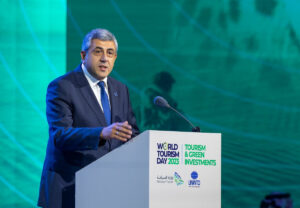
After serving two terms as Secretary-General of UN Tourism, Zurab Pololikashvili is seeking to lead the organization for a third consecutive term. His tenure at the organization began in January 2018, when he took over from Jordanian Taleb Rifai. Before joining UN Tourism, Pololikashvili served as Georgia’s ambassador to Spain. Previously, he served as Georgia’s Minister of Economic Development and Deputy Minister of Foreign Affairs. He also served as CEO of FC Dinamo Tbilisi, Georgia’s most renowned professional football club.
During his last term, he had to deal with the worst crisis the tourism sector has ever experienced worldwide, the COVID-19 pandemic, which virtually paralyzed activity. However, this year alone, the situation has been reversed, with visitor numbers exceeding those prior to 2020. In other words, the sector has returned to normal and now has great expectations for the future. His balance also includes the opening of regional offices in Rio de Janeiro, Riyadh, and soon in Marrakech, and the aforementioned opening of the new office in Madrid, which is planned for this year, 2025.
Habib Ammar, from Tunisia.
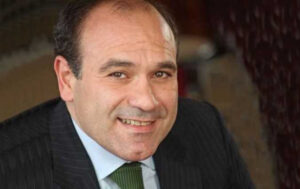
Currently holds the position of Executive Director at the Tunisian Ministry of Transport. Between 2010 and 2014, he headed the Tunisian National Tourist Office (ONTT). Throughout his career, he has held various roles in various ministerial departments, including Director of the Tourism Improvement Office at the Ministry of Tourism between 2005 and 2008. He graduated from the Advanced Cycle of the National School of Administration of Tunisia, specializing in General Administration. He also holds a Master’s degree in Management Sciences with a specialization in International Finance from the University of Paris IX Dauphine, as well as a Bachelor’s degree in Economics from the same institution.
Working against him is the unstable political situation in his country, which has negatively affected the Tunisian tourism sector.
Muhammad Adam, from Ghana.
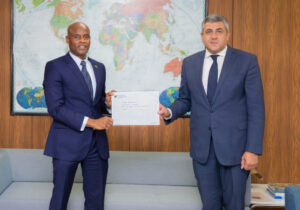
Until last December and since 2021, Muhammad Adam was his country’s ambassador to Spain. A career diplomat, he served as Ghana’s Consul General in Jeddah, Saudi Arabia, and as Counselor at the Embassy in Spain.
Shaikha Al Nowais, from the United Arab Emirates.

A graduate in Business Administration from Zayed University in Dubai, Shaikha Nasser currently serves as Vice President of Corporate Relationship Management among the owners of the Rotana Group, one of the leading hotel management companies in the Middle East, Africa, Eastern Europe, and Turkey. She is also part of the family that owns the company. Before joining Rotana, she worked for three years at the Abu Dhabi-based audit firm KPMG.
Gloria Guevara, from Mexico.
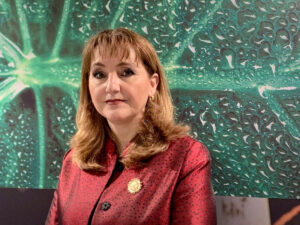
She was Secretary of Tourism and Director General of the Mexican Tourism Board during the right-wing government of Felipe Calderón. She later assumed the role of President and CEO of the World Travel & Tourism Council (WTTC). In recent years, she has been the Chief Strategic Advisor to the Ministry of Tourism of Saudi Arabia. He has the support of tourism lobbies linked to the sector’s major chains and operators, but it should be noted that the vote to elect the Secretary General is decided by the Council’s member countries, where priorities are primarily political.
Harry Theoharis, from Greece.
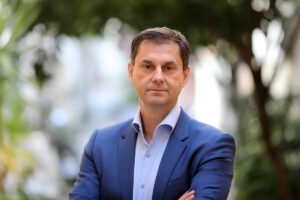
He holds a degree in software engineering from Imperial College London. He served as Secretary General of Information Systems in Greece and as Minister of Tourism in the center-right government of Kyriakos Mitsotakis from 2019 to 2021, which focused on revitalizing tourism after the pandemic.
Regarding other candidates, he stated that Pololikashvili has been in charge for too long and Guevara has a good understanding of the private sector, but this organization needs a strong public and political vision, which, in his opinion, the Mexican candidate lacks.




